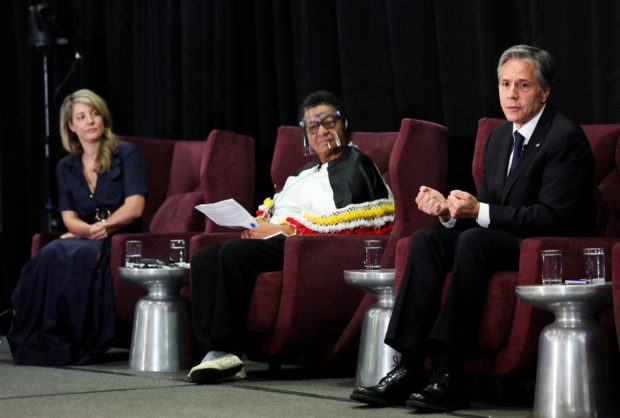
U.S. Secretary of State Antony Blinken speaks during a meeting with Panamanian Foreign Minister Erika Mouynes (not pictured) and Canada’s Minister of Foreign Affairs Melanie Joly, as the ninth Summit of the Americas continues, in Los Angeles, California, U.S., June 8, 2022. REUTERS/Mike Blake/Pool
LOS ANGELES — The Biden administration unveiled a new proposed U.S. economic partnership with Latin America on Wednesday as regional leaders gathered for a summit in Los Angeles whose agenda has been undermined by discord over the guest list.
Seeking to counter China’s growing clout in the region, a senior administration official said President Joe Biden is offering neighbors to the south an alternative that calls for increased U.S. engagement, including more investment, strengthening supply lines and building on existing trade deals.
However, Biden’s “Americas Partnership for Economic Prosperity,” which still appears to be a work in progress, stops short of offering tariff relief and, according to the U.S. official, will initially focus on “like-minded partners” that already have U.S. trade accords. Negotiations are expected to begin in early fall, the official added.
Arriving in Los Angeles, Biden was due to outline his plan in a speech on Wednesday to open the summit, which was conceived as a platform to showcase U.S. leadership in reviving Latin American economies and tackling record levels of irregular migration at the U.S.-Mexico border.
But Biden’s agenda has been marred by a partial boycott by leaders upset at Washington’s decision to exclude Communist-run Cuba and the leftist governments of Venezuela and Nicaragua.
U.S. officials hope the Summit of the Americas in Los Angeles and a parallel gathering of business executives can pave the way for greater cooperation as governments grappling with higher inflation work to bring supply chains stretched by the COVID-19 pandemic closer to home.
“It’s much better for us … to have a supply chain here in the Americas than it is for us to be dependent on a supply chain that comes from China,” U.S. ambassador to Mexico Ken Salazar told Reuters.
Even as Biden deals with major priorities such as mass shootings, high inflation and the Ukraine war, the U.S. official said the president is seeking to press the administration’s competitive goals against China with the launch of the new partnership for the region.
Washington, which already has a combined trade pact with Canada and Mexico, a collective one with Central America and a series of other agreements, will attempt to develop new customs, digital trade, labor, environmental and corporate accountability standards, according to the official.
U.S. Secretary of State Antony Blinken told business leaders at the summit that there remain “huge challenges” to creating a positive environment for investment, citing “everything from regulatory frameworks to corruption.”
Biden’s plan would aim to mobilize corporate investments, revitalize the Inter-American Development Bank and create clean energy jobs.
Still, the administration appeared to be moving cautiously, mindful an initiative that promotes jobs abroad could face U.S. protectionist pushback.
China’s challenge
The challenge from China is clearly a major consideration.
China has widened the gap on the United States in trade terms in large parts of Latin America since Biden came into office in January 2021, data show, underscoring how Washington is being pushed onto the back foot in the region.
An exclusive Reuters analysis of U.N. trade data from 2015-2021 shows that outside of Mexico, the top U.S. trade partner, China has overtaken the United States in Latin America and widened its advantage last year.
“The best antidote to China’s inroads in the region is to ensure that we are forwarding our own affirmative vision for the region economically,” the administration official said.
Biden’s aides have framed the summit as an opportunity for the United States to reaffirm its commitment to Latin America after years of comparative neglect under Biden’s predecessor Donald Trump.
But diplomatic tensions broke into the open this week when Washington opted not to invite the three countries it says violate human rights and democratic values.
Rebuffed in his demand that all countries must be invited, Mexican President Andres Manuel Lopez Obrador said he would stay away, deflecting attention from Biden’s goals and toward regional divisions.
Biden’s national security adviser Jake Sullivan told reporters aboard Air Force One that some leaders’s choice not to attend reflected their own “idiosyncratic decisions” and that substantive work would still be accomplished.
Cuban President Miguel Diaz-Canel, in a televised speech, said the United States lacked “moral authority” to lecture on democracy and thanked Lopez Obrador for his “solidarity.”
The leaders of Guatemala and Honduras, two of the countries that send most migrants to the United States, also said they would not go, undermining efforts by U.S. officials to craft a “declaration” on joint plans to address mass migration.
Still, leaders from more than 20 countries in the region will attend, including Canada, Brazil and Argentina.
With Venezuelan President Nicolas Maduro excluded, Biden spoke by phone from Air Force One with opposition leader Juan Guaido, the White House and Guaido’s aides said. Washington recognizes Guaido as Venezuela’s legitimate president, having rejected Maduro’s 2018 re-election as a sham.
Biden will use his meeting on Thursday with Brazilian President Jair Bolsonaro to talk about climate change and will also discuss the topic of “open, transparent and democratic elections” in Brazil. Bolsonaro, a populist admirer of Trump, has had chilly relations with Biden.
RELATED STORY:
Exclusion of countries from Americas Summit a ‘mistake,’ says Chilean president
Mexico president says won’t attend Americas Summit, will visit Biden in July